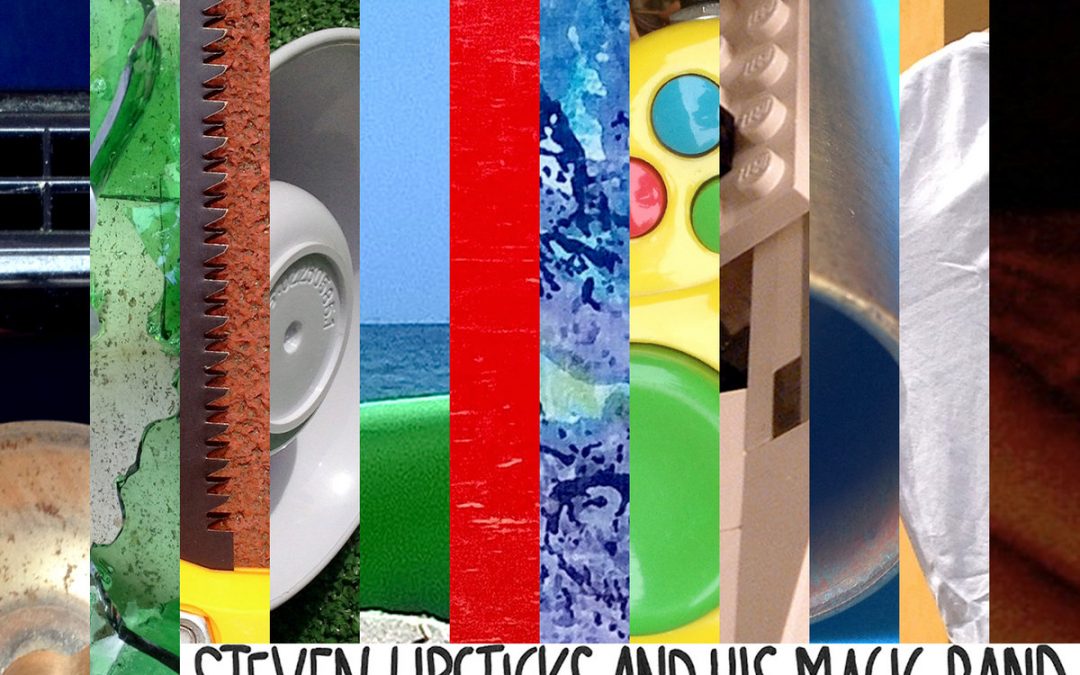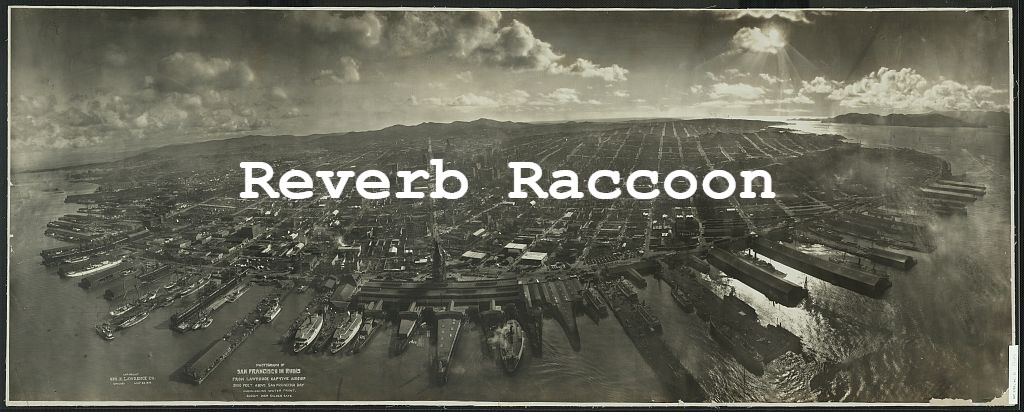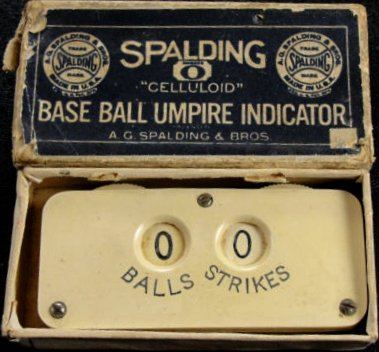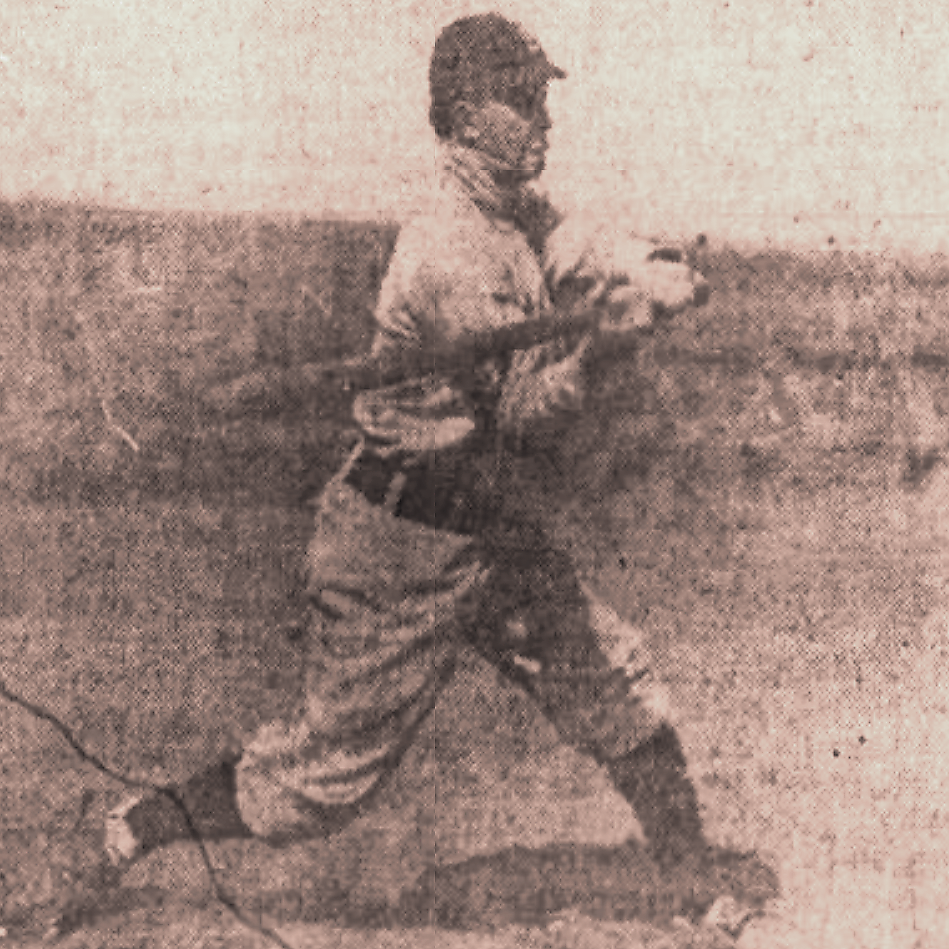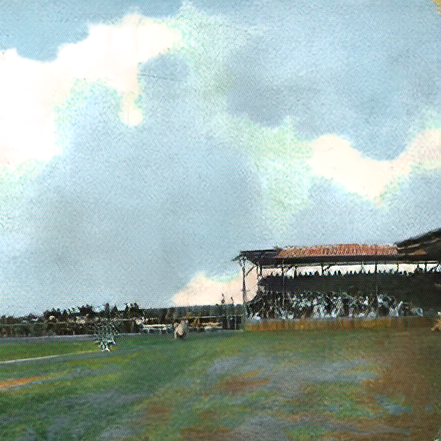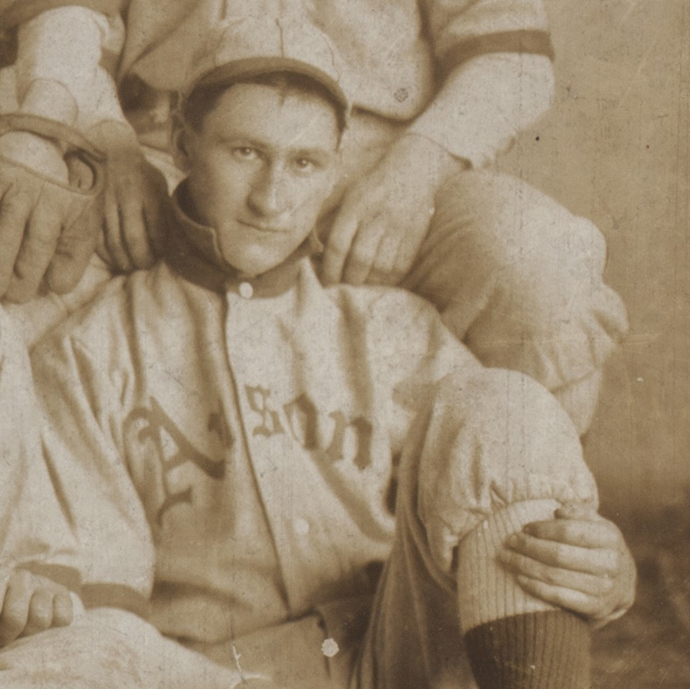Steven Lipsticks and his Magic Band: Why Isn’t This Guy Famous?
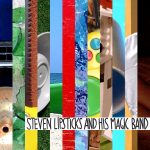 Eons ago, in the Cretaceous Era of my youth, I washed ashore against the rocky substrate of Spearfish, South Dakota. The town had little to recommend it, save a view of red sandstone hills and a bar called Bernie’s that served cheap 3.2 beer at happy hour. Encountering a member of the local species, I inquired as to the opportunities for hearing live music. “Try the Holiday Inn out by the interstate,” he replied. “They’s a good band whats gonna play this comin’ Saturday night.”
Eons ago, in the Cretaceous Era of my youth, I washed ashore against the rocky substrate of Spearfish, South Dakota. The town had little to recommend it, save a view of red sandstone hills and a bar called Bernie’s that served cheap 3.2 beer at happy hour. Encountering a member of the local species, I inquired as to the opportunities for hearing live music. “Try the Holiday Inn out by the interstate,” he replied. “They’s a good band whats gonna play this comin’ Saturday night.”
The fellow spoke as if Saturday night was a far distant eventuality when, in fact, it was Saturday night. I dutifully trucked out to said interstate and settled in behind a table in a lounge that was completely devoid of other patrons. Not a good sign. As I sipped a plastic cup full of 3.2 beer that tasted suspiciously like a gassy 1.5% near-beer, four guys dressed like Mormon missionaries ambled onto the “stage,” a corner of the room without tables, sorted out their guitar-guitar-bass-drums lineup, and stumbled into “Leaving on a Jet Plane.” It was… very good. And I know that wasn’t the beer talking, because I’m not sure my plastic cup actually had any beer in it.
At that time I fancied myself a singer-songwriter and would occasionally throw down my $2 entry fee at an open mike night, figuring stardom was just a G7 chord away. And I remember thinking, sitting in the Holiday Inn Lounge out by the interstate in Spearfish, South Dakota: “These guys are a lot better than I am, and they can’t even get out of the Holiday Inn. What chance do I have?”
Fast forward (cough-cough) years decades. I seriously doubt that the Four Mormons ever made it out of the lounge. I never made it as a singer-songwriter, primarily because I could neither sing nor write songs. But, just as on that distant night in South Dakota, when I was surprised to hear good music where I least expected it, I continue to be amazed by the volume of great music that is being created in the unlikeliest places: bedrooms, barrooms, basements, garages, apartments, tiny flats. People in every nook, cranny, crack, crevasse are recording music. The Music Industry may be dead, but we may be experiencing the Golden Age of musical creativity.
This week the Gift of Good Music comes to us from Bologna, Italy. Steven Lipsticks and his Magic Band has released a self-titled debut album – twelve tracks of pop, blues, and psychedelic folk – that is so good it will leave you thinking, “Why isn’t this guy famous?”
Steven Lipsticks is Stefano Rossetti, a guitarist-songwriter-singer responsible for almost every note on the album. Although described as a lo-fi “domestic recording,” meaning that it was recorded in a small flat by a single musician with a few friends helping out on the odd bits, the sound quality is better than the typical indie bedroom product. The instrumentation is crisp, the guitars covering a wide range of dynamics and styles. The vocals have a touch of recorded-in-the-living-room vibe, but Stefano’s straightforward, unaffected delivery makes them work. Think Syd Barrett’s “Love Song.”
The maturity of the songwriting is especially noteworthy: this is not a collection of half-baked ideas and guitar riffs. The arrangements are varied enough to keep your attention over the long haul, something many artists fail to accomplish in our single-track-oriented, put-the-iTunes-on-shuffle-and-go-for-a-run, societal mindset.
The musical sweep of the album is impressive. The tracks are diverse, yet fit together as a body of work. You will definitely want to listen to this one all the way through, start to end. The overall feel is a throwback to the album-oriented music of the mid-70’s, when you put the needle down on the edge of the vinyl and didn’t lift it off until you had to turn the record over for Side 2.
When I started this blog, two years and several lifetimes ago, my goal was to avoid being one of those reviewers who cites an endless reservoir of references and tries to name the old song that every new song sounds like. I just wanted to tell people if they should bother listening to the music. So to summarize Steven Lipsticks and his Magic Band: I like this album. I have listened to it many times, and I will listen to it many more times in the coming years. And you should listen to it, also. I think you will like it.
With the help of the internet, we “caught up with” Stefano Rossetti for a lengthy interview…
Your album covers a very wide range of musical styles. But the tracks hang together well as a song cycle, as a single entity. Was this planned, or a happy accident?
I knew from the start that Steven Lipsticks and his Magic Band would be an eclectic record because I wanted to put at least 10-12 of my songs in there and all of them were very different! But I’ve always liked the idea of “playing” with music genres, and I think that this sense of fun can be heard throughout the record. Maybe also the catchy melodies and the simple recording technique contribute to homogenizing the result. I just tried to make a tracklist that alternates ballads and faster songs to underline the variety of musical styles. I’m happy you enjoy it. Honestly, I’m pretty satisfied with how the record flows.
Many of the indie musicians I hear have an emotionally detached air in their lyrics. But your lyrics are much more personal…
Yes, there is surely a lot of autobiography in the lyrics, but also invented characters and many nonsense moments. In songs like “Being Together” and “Baby, You Should Know,” I mixed memories and imagination with interesting results, something that I’d like to do more in the future. In some other cases I paid more attention to the sound of the words, rather than their meaning.
What overall mood or theme would you use to describe the new songs?
I don’t think there is an overall mood on the record. Even when the most personal lyrics may look a bit sad, the music can be joyful. I like this contrast between opposite moods and I tried to apply it on some songs like “Dec. 8th” and “Still Riding the Tide,” for example.
I assume your first language is Italian. Do you find it difficult to express yourself in English?
No, not particularly. I have written songs in English since I was seventeen. I’ve always preferred English because of its sound. Italian is too wordy. [There’s got to be a joke here about not being able to see the hands moving, but I’ll let someone else make it. :)]
As an American, I’m happy to have all of the world’s pop music in English. But it almost seems like cultural imperialism…
The bands that I’ve listened to since I was a kid are mostly from UK and USA. I started later to discover Italian bands (and there’s a lot of interesting bands, you should check out!). But I agree with you: in Italy there is always this sensation that if you don’t sing in English then nobody will listen to you abroad. In fact, there’s a lot of English-singing indie bands.
Do you consider yourself a guitar player who sings and writes songs, or a singer-songwriter who plays the guitar?
Definitely a guitar player who sings and write songs.
Your guitar playing has a lot of muscle behind it. Are you a fan of hard rock and blues?
I’m not a fan of hard rock. I listened to Led Zeppelin and Deep Purple when I was at high school, but I soon got tired of both. I never liked guitar virtuosity. The only hard rock band that I still listen to is Black Sabbath, maybe because of their dirtier, more lo-fi attitude. I surely prefer blues and bluesy rock to hard rock. I’m a big fan of Dylan and the Stones, of course. And when I play solos I can’t avoid sounding bluesy because I often use the pentatonic scale. But I always try to add noise and notes to make the solos more melodic.
Many of the songs have both acoustic and electric guitars. It’s almost a throwback to the days when artists laid down a basic acoustic track, then layered on the electric guitars…
Yes, this was a trick to have a warmer sound, especially in songs on which I didn’t play the bass. That’s the case of “Riding the Tide” and the central part of “Aliens Hypnotizing Me.” I agree that it’s a very rétro technique, but I like it.
I had started to think that slide guitar is dead, or at least on its last breath. But you use it very effectively on a few tracks…
Yes, I love how slide sounds on strings and I think that it’s a very versatile instrument. You can do both bluesy and country sounds, or psychedelic effects, which is the case of “Stay Away from My Dreams.”
I hate it when reviewers ask about Influences. But when I listen to the album, I immediately think the Beatles and Green Day…
I’m not sure about Green Day, but the Beatles are definitely a big influence. I’ve always listened to them and I still do. But also the Kinks wrote timeless melodies and proto-punk hymns. And of course I love Syd Barrett: I’m a big fan of early Pink Floyd and Barrett’s solo records, they’re so ahead for their time. Yes, there are some punky tracks on SL&HMB, but I think that 70s punk and post-punk inspired me more than 90s punk-rock. However, I love 90s bands like Pavement, Guided by Voices, Weezer, and many Britpop bands including Oasis, another big influence. Blur are possibly my favourite band ever; they’ve always been so eclectic, and Graham Coxon is a guitar hero for me.
What is your earliest memory of music that really caught your attention?
Maybe my mother listening to Italian 70s songwriters like Francesco Guccini and Fabrizio De Andre’ while I was playing with Legos.
Have you played in bands in the past?
Yes, many. But with previous bands I never came to record something “in studio.” I still have some live recordings, most part of them are rubbish, but there are also some interesting things, like the post-rock band in which I used to play bass guitar when I was 18.
Are you able – or do you have any future plans – to perform the new album live?
I’m searching for some dates. I could make stripped-down versions of the songs playing solo, but it’s not the kind of live that I prefer, so I’m rehearsing with two friends of mine. We’re just three, two guitars and a drum, so the songs will sound dirtier and definitely punkier live.
How is a typical track planned and recorded?
Years ago I used to record everything that came to my mind onto tape with a small and noisy recorder, and there are still some not-bad ideas there that, once developed, I’d like to use for the next records. For the songs of this album, I made very lo-fi demo versions with classic guitar and voice, recorded at home with my computer. Most of my songs are written with classic guitar because I’m lazy and why waste time connecting the electric guitar to the effects and the effects to the amplifier (I also live in a very small room!) when you can immediately play with a classic guitar that’s hanging on the wall?
When I decided to make the album, the final versions of the songs were recorded at home, track by track, with Garage Band and no sound card, except for some acoustic guitar tracks, the synths (played by my flatmate) and some voice (my flatmate’s brother lent me a microphone and a sound card). But most of the songs were recorded simply playing and singing in front of the computer without connecting the instruments to it.
I thought that the Digital Age had put an end to Hidden Tracks, like the Clash’s “Train in Vain.” But you slipped one in there at the end…
Ahh, you caught “Jar of Poetry,” the ghost track! Yes, I know it’s quite strange nowadays, but I wanted to have a very small part of the acoustic demo on SL&HMB, so I choose the first version of “Jar of Poetry Revisited,” that is quite different from the 4th track of the album, being a short acoustic ballad instead of a pop-punk song. My girlfriend wrote the lyrics of that old version, then, when I decided to turn it into a faster tune, I added a second verse and a solo. “Jar of Poetry” is instead classic guitar and voice, but you can also hear my computer’s fan, a great protagonist of the first demo!
How much of the drumming is Real vs. Digital?
Almost all drumming is digital. They’re loops that I have made with Garage Band. But there is also some real percussion and handclaps.
And of course the obligatory Guitar Player Magazine question: what equipment do you use?
I have a Yamaha classical guitar and a 1996 made-in-the-U.S.A. Fender Telecaster, a small Vox amplifier (30 watts, transistor) and an even smaller Marshall amplifier (15 watts, transistor). Not many effects: an overdrive, a delay (both Boss), a Cry Baby and a Pro Co RAT, a very fuzzy distortion. My girlfriend lent me an Ibanez acoustic guitar and a friend lent me his bass, a very old one from the 80s. That’s it!
And finally, what message do you have for Reverb Raccoon’s vast hoard of loyal readers?
Follow me online, spread the word and listen to my record. It’s a good way to spend less than 38 minutes (you can also do other things in the meantime, I don’t mind)! And please let me know about some gigs. Me and my band mates can’t wait to play these songs live!
Thanks, Stefano! Those were some great answers to some not-so-great questions! Steven Lipsticks and his Magic Band is available for streaming and download on Bandcamp. It’s Name Your Price so be sure to pony up a few Euros or Dollars. It’s worth it. And be sure to wait for the ghost track at the end… The album is also available for streaming on Soundcloud.
Visit Steven on Facebook and tell him “Reverb Raccoon sent me!” Ciao!
Bonus Track: One of my favorites from the album, the folky-rocky “Dec. 8th.” Enjoy!

